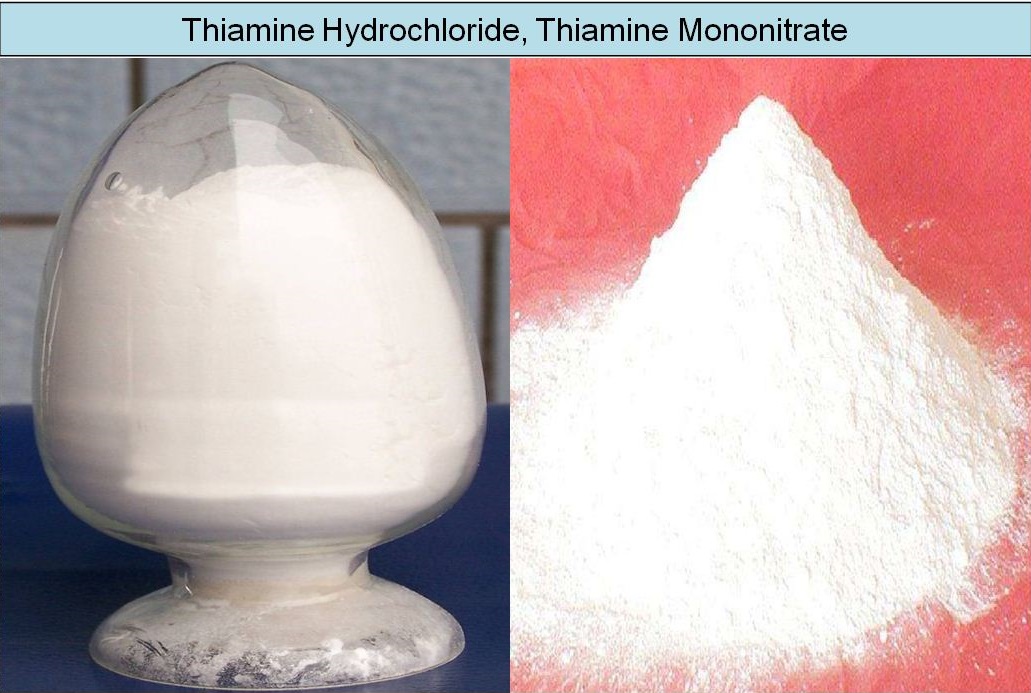We unleash your business potential by maximize the business innovation.
Send EmailVitamin B1, Thiamine Nitrate, Thiamine Mononitrate, Vitamin B1 Mononitrate, 532-43-4
Product Information
-
Name / Synonyms: Vitamin B1 Mononitrate, Thiamine Mononitrate
-
CAS Number: 532-43-4
-
Form: White or nearly white crystalline powder / small colorless crystals
-
Category: Food, Pharmaceutical, Agricultural
-
Stability: More stable than thiamine hydrochloride, preferred in dry formulations
-
Solubility: Water-soluble, suitable for supplements and pharmaceutical use
Biological Importance
-
Active form: Converts to Thiamine Pyrophosphate (TPP), essential in carbohydrate metabolism
-
Human health benefits:
-
Energy production
-
Supports nervous system function
-
Maintains cardiovascular health
-
Regulates appetite
-
Contributes to eye health
-
-
Animal health benefits:
-
Promotes growth and development
-
Supports energy metabolism
-
Aids nerve transmission
-
Important for reproductive health
-
Maintains cardiovascular function
-
Applications
-
Food industry: Fortification of flour, pasta, rice, breakfast cereals
-
Pharmaceuticals: Multivitamin tablets, capsules, injections
-
Animal feed: Used in premixes to enhance growth and productivity
-
Industrial use: Stable crystalline form suitable for ERP systems and long-term storage
Natural Sources
-
Whole grains (wheat, brown rice, oats)
-
Meat (especially pork)
-
Nuts (almonds, peanuts, sunflower seeds)
-
Legumes (lentils, chickpeas, beans)
-
Nutritional yeast
-
Fish and dairy (in smaller amounts)
Recommended Daily Intake (NIH)
-
Adults: 1.2 mg
-
Pregnant women: 1.4 mg
-
Breastfeeding women: 1.5 mg
-
Children: 0.5–0.9 mg (depending on age)
Regulatory Compliance
-
Food additive approval: Recognized by FDA, EFSA, Codex Alimentarius
-
Pharmaceutical standards: USP, EP, JP compliance required
-
Feed additive: Approved by veterinary and agricultural authorities
-
Documentation: COA, stability reports, regulatory compliance certificates required
Benefits
-
Humans: Energy metabolism, nervous system support, appetite regulation, cardiovascular and eye health
-
Animals: Growth, reproduction, energy metabolism, nervous system support
-
Industry: High stability, long shelf life, reliable fortification
Risks and Considerations
-
Excess intake: Rare; may cause mild gastrointestinal discomfort
-
Processing loss: Heat and alkaline conditions can degrade thiamine
-
Deficiency risks:
-
Humans: Beriberi, Wernicke-Korsakoff syndrome
-
Animals: Neurological disorders
-
-
Storage: Keep in sealed containers, away from moisture and light
-
Fortification strategy: Adjust dosage to account for cooking losses
-
Supplier selection: Verify purity, particle size, stability data, and regulatory compliance
Summary
Vitamin B1 Mononitrate is a stable, water-soluble form of thiamine widely used in food fortification, pharmaceuticals, and animal feed. It plays a critical role in energy metabolism, nervous system function, and cardiovascular health. Its stability makes it ideal for industrial applications, while deficiency can lead to serious health issues in both humans and animals.
